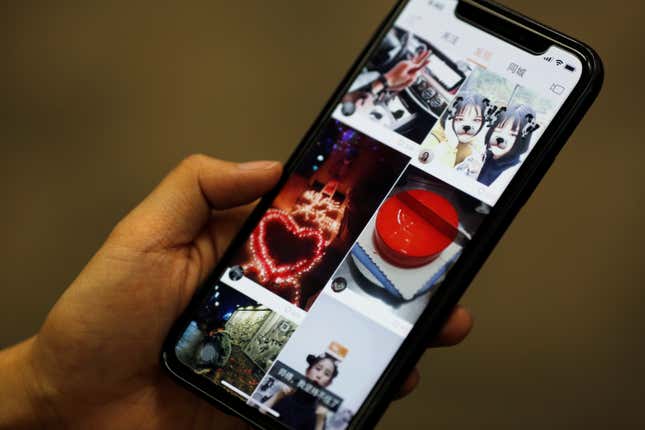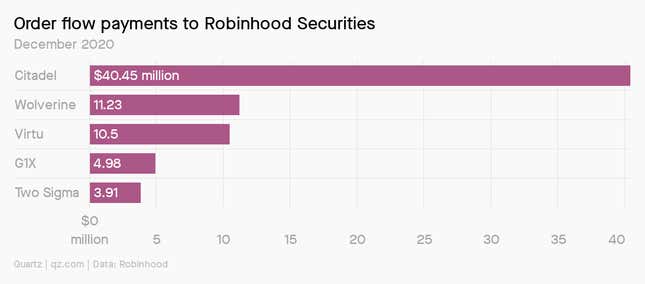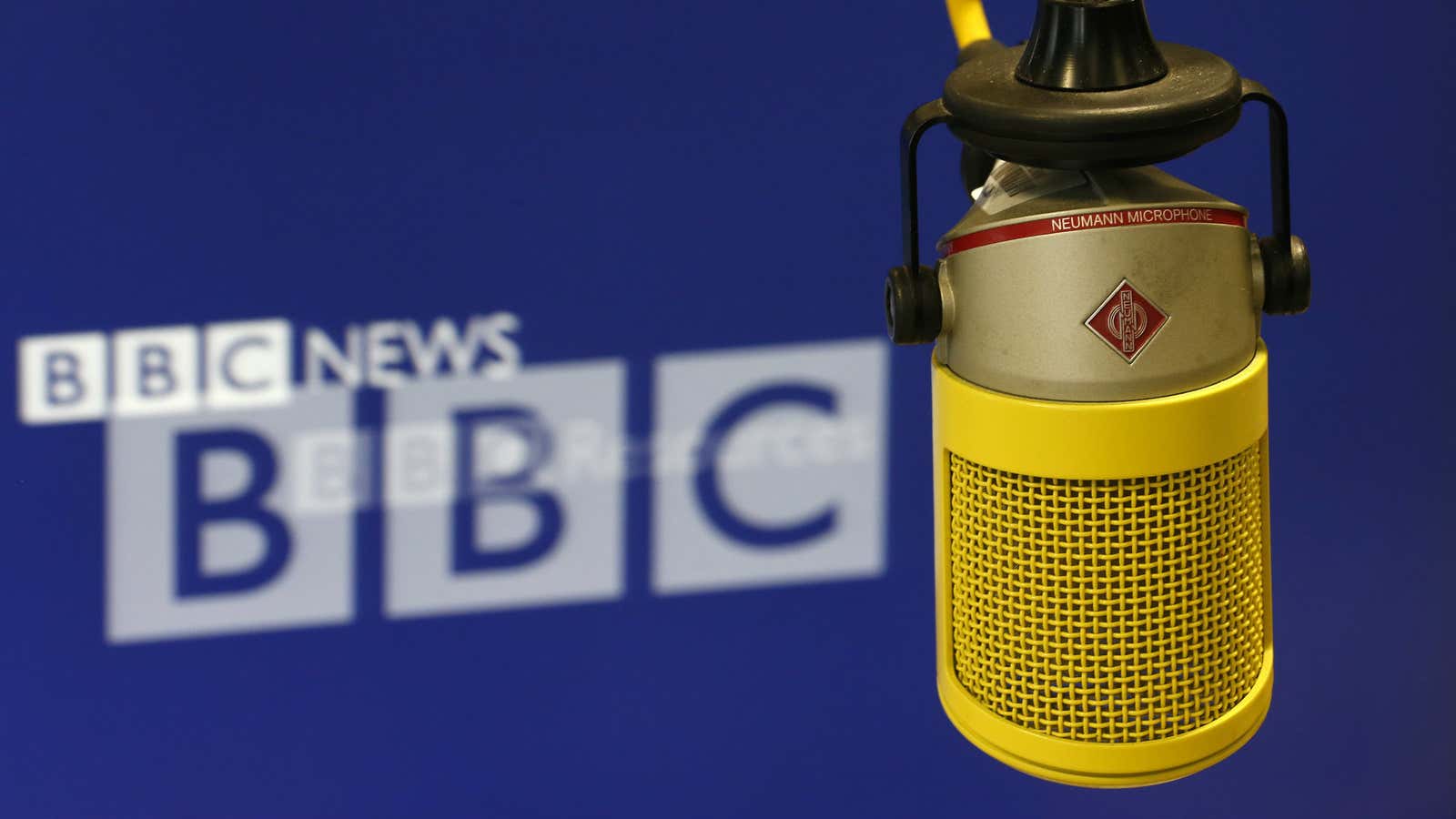Good morning, Quartz readers!
Here’s what you need to know
The BBC comes under fire in China. Officials and internet users accused the broadcaster of smearing China, after the UK revoked the license of Chinese state television channel CGTN.
The UK will start hotel quarantines. Residents returning from Covid-19 hotspots such as South Africa will have to stay for 10 nights in a hotel starting Feb.15.
More Olympics controversy. Nearly 200 organizations have called for a boycott of next year’s Winter Games in Beijing citing its human rights abuses.
Johnson & Johnson submitted its Covid-19 vaccine for US approval. The single-shot jab will become the country’s third if it gets a regulatory nod.
Kirin cut ties with Myanmar’s military. The Japanese beer giant ended its partnership with a local brewery over ties to generals who staged the coup. Separately, the US president Joe Biden and the UN called for the release of Aung San Suu Kyi.
TikTok’s Chinese rival surged 200% in its Hong Kong debut. Short video app Kuaishou opened at HK$338 ($43.6), far above its IPO price of HK$115. Read more below.
What to watch for

Chinese short video app Kuaishou listed in Hong Kong today, and its IPO has been oversubscribed 1,200 times—the city’s most sought after deal yet. As a result, the company priced its shares at the top range of HK$115 ($15), allowing it to raise $5.4 billion, the biggest tech IPO since Uber in 2019.
The surge in investor interest could be, in part, a result of liquidity in the market, but the oversubscription is also a confidence vote for Kuaishou’s focus on grassroots users from small towns. A rival to TikTok—or Douyin as the app’s Chinese version is known—Kuaishou’s videos often feature users from rural areas, who film themselves feeding chickens or pulling off pranks on friends.
Although Kuaishou still lags behind Douyin, its strategy of advocating the value in ordinary people’s lives could please a China that has become increasingly uncomfortable with the rich and powerful.
Charting Robinhood’s dealings with large trading firms
One of the things that has always complicated Robinhood’s finance-for-the-little-guy pitch is that it works hand in glove with the big guys. The main way the brokerage makes money is that it sells its retail transactions to large trading companies that execute the trades.
Robinhood Securities received $71 million in order flow payments for stocks and options in December, according to a filing, more than half of which came from hedge fund billionaire Ken Griffin’s Citadel Securities.

Robinhood’s story of financial democratization came under fire last week when it blocked traders from buying GameStop and other stocks. John Detrixhe unpacks what’s really going on.
What’s next for Amazon
Succession plans are a bit like airplane landings: They only make news when something goes wrong. While it’s too soon to tell if Amazon’s CEO transition from Jeff Bezos to Andy Jassy will hit the tarmac smoothly, there is no shortage of ways it could get bungled.
Let’s hope it fares better than these succession disasters:
🐭 Disney: Michael Eisner ➡️ Michael Ovitz
🏈 New York Jets: Bill Belichick ➡️ Bill Parcells ➡️ Bill Belichick
📺 The Tonight Show: Jay Leno ➡️ Conan O’Brien
👑 England’s throne: Edward V ➡️ Edward VI
Even assuming all goes well, Bezos is leaving behind some unfinished business.
✦ The next logical step from “Quartz reader” is “Quartz member.” Let us show you why—try it out free for seven days.
You asked about the Janssen vaccine’s lower efficacy
Since the Janssen vaccine is not as effective as Pfizer or Moderna’s, does that mean it’s not as good at helping the world beat Covid-19?
You’re right—Janssen says its Covid-19 vaccine can prevent 66% of symptomatic cases, while vaccines from Pfizer-BioNTech and Moderna showed they could stop over 90% of symptomatic cases. But Janssen’s vaccine shines by another metric: reducing the severity of the disease, potentially freeing up hospital beds.
One of the most dangerous effects of Covid-19 is that it sends about 2% of patients to intensive care units in hospitals. The more Covid-19 patients lying in hospital beds, the more likely overwhelmed hospitals will be unable to treat future Covid-19 cases and unrelated medical emergencies. Across the US, roughly 77% of ICU beds are occupied at the time of writing, according to Johns Hopkins University’s Covid-19 tracker.
According to company data released on Jan. 29, Janssen’s vaccine prevents 85% of severe Covid-19 cases, which is great news from a public health standpoint. “To keep people out of the hospital and prevent death—this is value added,” said Anthony Fauci, the director of the US National Institute on Allergy and Infectious diseases on NBC Nightly News.
Surprising discoveries
Do you want to solve a code case? Animation code from Disney’s Frozen helped prove the cause of death for nine Russian hikers killed in 1959.
Amazon employees look for meaning in Andy Jassy’s exclamation point use. Is the number of punctuation marks some sort of code???
A Wall Street Journal ad called out AT&T’s slow internet speeds. Aaron Epstein, an AT&T customer since 1960, thinks the company has some explaining to do.
There’s a new species of whale in the Gulf of Mexico. But there are fewer than 100 of them.
Nearly 500 San Franciscans fell for a “verified” home joke. A local artist set up a service for homeowners to apply for a “blue check” badge, similar to those seen on social media sites.
Our best wishes for a productive day. Please send any news, comments, cold cases for Disney animators to solve, and what it means when Andy Jassy uses three exclamation points to [email protected]. Get the most out of Quartz by downloading our iOS app and becoming a member. Today’s Daily Brief was brought to you by Jordan Lebeau, Jane Li, Mary Hui, Susan Howson, and Liz Webber.
